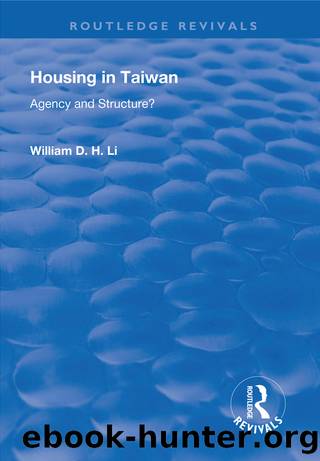Housing in Taiwan by William D.H. Li

Author:William D.H. Li [Li, William D.H.]
Language: eng
Format: epub
Tags: Social Science, General, Sociology
ISBN: 9780429851414
Google: YPmADwAAQBAJ
Publisher: Routledge
Published: 2019-01-15T04:51:12+00:00
Buying pre-sale house for investment
For this kind of buyer, the purpose of buying pre-sale houses is to increase their wealth, not to fulfil their housing needs. Mrs. B (cited above in 4.2.2) had more than three houses in Taipei city when she bought her pre-sale house. Some she used herself and others were rented. She told me:
Buying pre-sale houses is a kind of investment, a good way to guard against inflation. Buying pre-sale does not require a large amount of capital because of the low down payment and I can always sell it later; or when it is completed, I can rent it out.
Mr.F (IB Number 6) now stays with his brother's family. The reason he bought a pre-sale house was because he saw it as a kind of saving plan: 'if I put some money into a pre-sale house for two years I then own a house and the value of the house will be greater than the total amount of money I spent.' Such cases show that buying pre-sale houses are often seen as a kind of investment, where the pre-sale payment arrangement is an important factor in the decision to make it. It is important to note that investors in the housing market are not small in number as Table 23 demonstrates.
Table 23 shows the housing distribution in Taipei city in 1979 and 1989 according to individual households (houses owned by companies and other associations are excluded.) It shows that, in 1979, over 397,232 housing units were owned by 318,177 households (which is about 58 per cent of total households in Taipei)(the statistics do not discriminate between households who own ten and those who own more than ten units). In other words, about 58 per cent of households owned the total number of housing units in Taipei city. It is more interesting to note that among house owners in 1979, 15 per cent of the total had more than one housing unit and these households (which formed only 9 per cent of all households in Taipei) owned more than 32 per cent of total housing stock in 1979.
Table 23 House-owners in Taipei 1979, 1989
No. of houses owned by households 1979 1989 Growth rate (%)
1 269,335 478,913 77.8
2 34,394 64,966 88.8
3 7,327 15,264 108.3
4 3,706 6,284 69.5
5 1,455 2,810 94.5
6 722 1,446 100.2
7 336 765 127.6
8 255 525 105.8
9 165 343 107.8
Own 10 and over 10 units householders 482 1,064 120.7
Total no. of homeowners 318,177 572,380 79.9
Total no. of houses in Taipei over 397,232 over 725,781
Total no. of households in Taipei 542,041 787,664 45.3
Download
This site does not store any files on its server. We only index and link to content provided by other sites. Please contact the content providers to delete copyright contents if any and email us, we'll remove relevant links or contents immediately.
Collaborating with Parents for Early School Success : The Achieving-Behaving-Caring Program by Stephanie H. McConaughy; Pam Kay; Julie A. Welkowitz; Kim Hewitt; Martha D. Fitzgerald(898)
Entrepreneurship Education and Training: The Issue of Effectiveness by Colette Henry Frances Hill Claire Leitch(665)
Adding Value to Policy Analysis and Advice by Claudia Scott; Karen Baehler(499)
Materializing the Middle Passage by Jane Webster;(496)
Race and American Political Development by unknow(488)
Sociological Perspectives of Health and Illness by Constantinos N. Phellas(478)
American Government and Politics Today by Steffen W. Schmidt Mack C. Shelley Barbara A. Bardes(475)
Human and Global Security : An Exploration of Terms by Peter Stoett(461)
Control Of Oil - Hardback by Kayal(460)
The Disappearance of Rituals: A Topology of the Present by Byung-Chul Han(399)
Advances in Child Development and Behavior, Volume 37 by Patricia J. Bauer(396)
The Catholic Church and European State Formation, AD 1000-1500 by Jørgen Møller(388)
The World According to China by Elizabeth C. Economy(379)
Theories of Counseling and Psychotherapy: A Case Approach by Nancy L. Murdock(370)
Left Is Not Woke by Susan Neiman(367)
Application of classical statistics, logratio transformation and multifractal approaches to delineate geochemical anomalies in the Zarshuran gold district, NW Iran by unknow(362)
Turkey's Relations with the West and the Turkic Republics: The Rise and Fall of the Turkish Model by Idris Bal(353)
Cross-Cultural Child Development for Social Workers by Lena Robinson(348)
Japan's Ainu Minority in Tokyo by Mark K. Watson(331)
